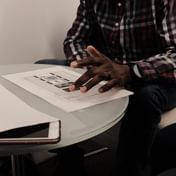
In this series, we ask anthropologists working in tech to reflect on the place of anthropology in their quotidian practices and professional lives. We use the design convention of the “how might we” question to ask, how might we use anthropology in design to affect not only technological but organizational change in the service of radically reimagined more inclusive, equitable, and livable futures? How might we read and engage with critical theorists both explicitly focused on technology and in adjacent fields who are thinking with an anthropologically informed lens about the problems we confront every day? The contributors are practitioners working in user research, consulting, management, design, and creative leadership at a range of levels and companies and across the world. Not all of the writers self-identify as anthropologists, but all of them bring anthropological concepts to their work and are inspired by theories and knowledge from the discipline.
Posts in This Series

Introduction: Technology and Anthropological Ways of Knowing
Anthropologists argue that our discipline trains people to see the world critically, to be aware of the arbitrariness of conventions and norms, to understand th... More

Notes from a New, Black UX Researcher
I stared anxiously at my laptop minutes before my first user experience (UX) interview. COVID-related family obligations had called me home the week before, and... More

What Can Tech Learn from Crip Futurity?
The disability to come . . . will and always should belong to the time of promise.” —Robert McRuer Technology and disability have a long, sometimes uncomfortabl... More

A Case for Design Anthropology for Creating Human-Centered AI
I’ve spent the last five years as a lead design researcher or principal design manager on a number of automation and intelligent systems projects. In my researc... More

Using Ethnography to Push for Organizational Change and More Inclusive Product Education
When I first started working at Facebook as a UX researcher, I tried to hide my background as an anthropologist. I felt like an odd duck, the one who, among a t... More

Anthropology in Entertainment Research: Asking and Answering Meaningful Questions amid Global Crises
“A moral science of possibilities”—that’s what anthropologist Michael Carrithers (2005) calls the field of anthropology. I wholeheartedly agree with that transl... More

“What does this mean?” and “What should we do?” How Anthropological Theory Meets Business Relevance in the Digital Age
Several years ago I was walking a team through the results of a study testing prototypes with twelve PC game players. Responses had varied, but what I was excit... More

Understanding the Move to Cloud with Design Ethnography
Ethnography is typically thought of as a time intensive method for integrating oneself into a culture and learning about people’s ways of life. In industry, due... More

Digitalization and Medicalization of a Post-COVID-19 World
As a trained ethnographer working in consulting and involved in government sponsored projects in China, I grapple with rapidly evolving changes in society as we... More

From Critical Theories to Practical Frameworks: A Call for Translation
“You’re so lucky to have a PhD in anthropology, those are so hot right now” is, I confess, not what I expected to hear when I abandoned the academic job market.... More